By by Frances Kai-Hwa Wang
NBC News Asian America —
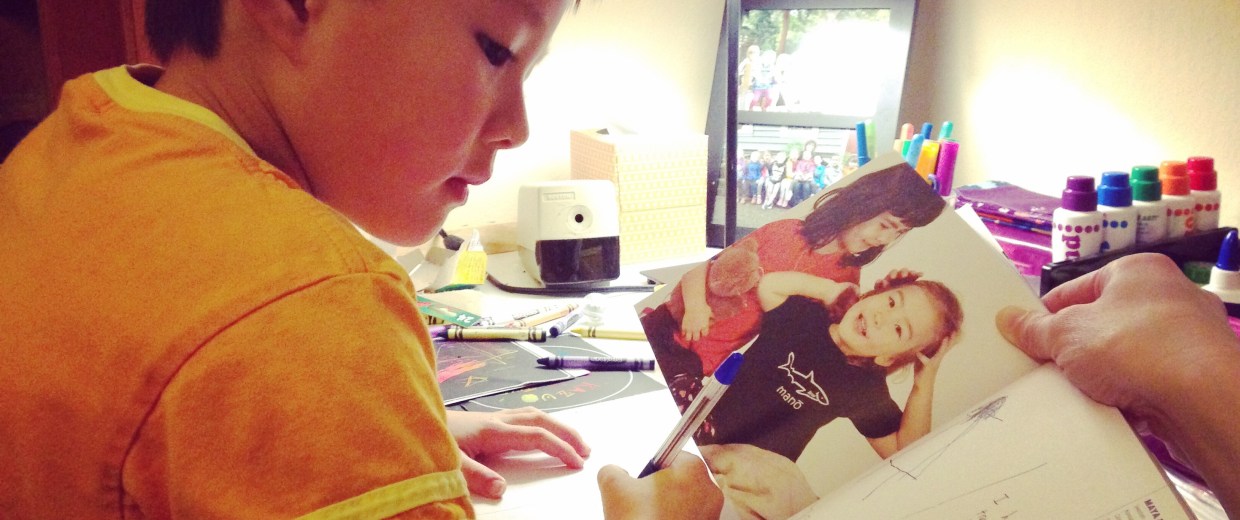
Sharon H. Chang’s son with a copy of Kip Fulbeck’s “Mixed: Portraits of Multiracial Kids.” Courtesy of Sharon H. Chang
Scholar and activist Sharon H. Chang’s book, “Raising Mixed Race: Multiracial Asian Children in a Post-Racial World,” published last December by Routledge, generated excitement among reviewers and readers. More than a research study and more than a parenting guide, the book was awarded #1 New Release on Amazon before it had even begun shipping, and it sold out the first weekend it was released.
“‘Raising Mixed Race’ represents not only years of work on my end but a multitude of others’ lived racial realities; stories about and involving mixedness that are poignant, sharp, relevant and vital, and yet – remain mostly untold in America and around the world,” wrote Chang in her blog, Multiracial Asian Families, when announcing her book. “It is my sincere belief if we engage with ‘Raising Mixed Race,’ it can (will) challenge our thinking on mixedness to go deeper and contribute to moving society as a whole towards justice, healing and true transformation.”
With interviews with 68 parents of 75 young multiracial Asian children about race, racism and identity, Chang delves into history, critical mixed race studies, changing demographics, personal experiences, and includes advice for parents, families, teachers, and friends of multiracial Asian children.
NBC News spoke with Chang about her new book, her research on mixed race families, and why it’s important for parents and children to talk about identity.
Please tell us a little about your family background and how you came to this project. Why did you decide to write this book?
My father is a Taiwanese immigrant who came to America in the 1970’s, not long after the Immigration Act of 1965 lifted anti-Asian exclusionary restrictions which had been in place for decades. He met and married my white mother in that same decade which, of course, was also not long after the landmark civil rights Supreme Court case Loving v. Virginia which struck down laws prohibiting interracial marriage. My mother is white American of fairly recent Slovakian, German, and French Canadian descent — my Slovakian great grandmother escaped Eastern Europe when she was sixteen and migrated alone through Ellis Island. [The people in] her family were farmers and she became a factory worker in the U.S.
Today I am married to a mixed race man whose mother is a Japanese immigrant, came in her 20s as well, and whose father is white of longtime white American descent, many generations back, it is thought, to colonization.
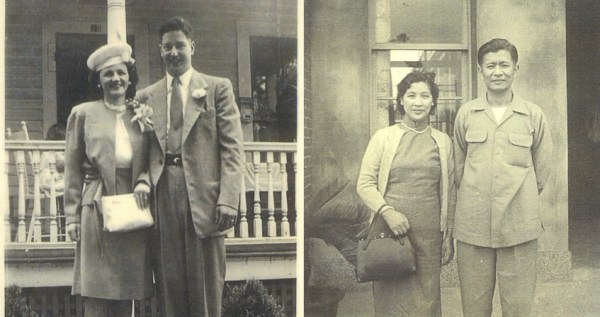
Grandparents of Sharon H. Chang, author of “Raising Mixed Race: Multiracial Asian Children in a Post-Racial World.” Courtesy of Sharon H. Chang
Both my husband and I have always been conscious of being mixed “others” whether here or abroad. It’s a pretty pervasive global reality. We’ve definitely experienced otherness visiting family in our Asian home cultures, Taiwan and Japan, but I have also traveled in Europe, Latin America, and Africa, and experienced the same feeling [and] treatment. So when we first became a couple in the early 2000s, we had a lot, a lot of conversations about our ongoing lived lives as multiracial peoples in a raced world. We had never had opportunities to be close to other mixed race persons and share these things so just being together and talking alone was a revelation
Then we had our son in 2009 and I suddenly felt a different, deeper investment in these questions about multiraciality. I wasn’t satisfied anymore just thinking about the questions. I wanted answers. So I set out to find any resources I could that would engage us in learning critically about race and mixed race: academic books, memoirs, nonfiction, parenting books children’s books, toys, etc. And I could barely find anything. Which, given the surging numbers of mixed race peoples in the U.S., was not only shocking to me, but infuriating. People like me and my family still barely exist to the American public and if we do, it’s only via being used as a lever to erroneously prove America is approaching “post-raciality” when it obviously isn’t. It was at that point I decided to begin interviewing for my own critical mixed race book. In particular I wanted to examine what’s happening around early racial socialization for this next upcoming generation cohort which is increasingly identifying as “more than one race.”
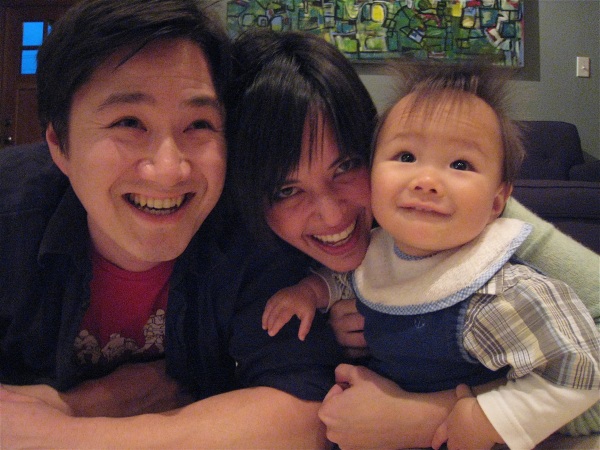
Sharon H. Chang, author of “Raising Mixed Race: Multiracial Asian Children in a Post-Racial World,” with her husband and son. Courtesy of Sharon H. Chang
Why is it important to talk to multiracial Asian-American kids about race? Are people doing it?
In my research, I found that parents avoided talking to their young mixed-race Asian kids about race, racism and oppression to a very high degree. This is so worrisome given my research [that] concurrently showed these kids already clearly observing and absorbing race narratives from the mainstream, demonstrating advanced racial understandings, and experiencing racist discrimination themselves.
The revelation that parents resist having race conversations with their mixed kids here is also incredibly worrisome when we consider that A) these multiracial children represent one of the fastest-growing upcoming generational cohorts in our society, a society plagued by injustice and discrimination; but B) aren’t being supported in gaining critical and resistant tools from the start to help them become aware, empowered citizens engaged in making change.
This is all to say, it is beyond incredibly important to talk to multiracial Asian-American kids about race — not only because they are raced people in a racist society, but because we need everyone engaged if we are going to move this nation towards true transformation.
What are some of the most important parenting maxims you would pass on to parents of multiracial Asian-American kids? What is your message to these parents? To these kids?
Great question and the entire last chapter of the book is devoted to it. Chapter 8 of “Raising Mixed Race” is called “Point of Intervention.” In it I give multiple suggestions for things adults can do to support mixed race children. Knowing that everybody has a different entry point into making change, the chapter is divided in micro-, meso-, and macro- suggestions that move from challenging your own thinking, to looking at your neighborhood [or] community, to getting involved on a national or even global scale. But I think the essential first steps for every parent of multiracial Asian-American kids are found in the “micro-” section: Be Concerned, Be Aware, and Be Intentional.
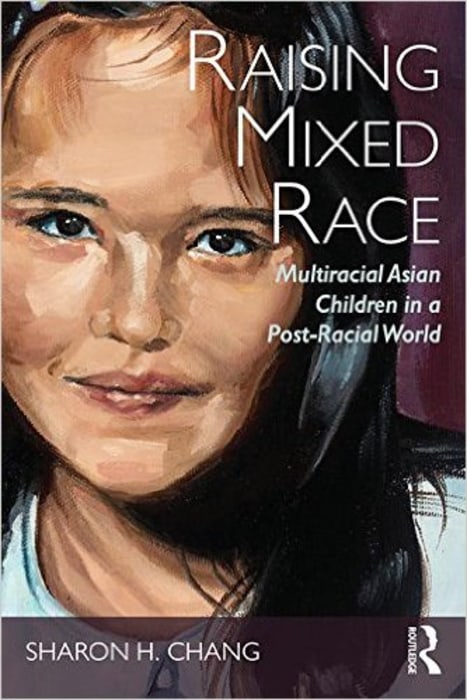
“Raising Mixed Race: Multiracial Asian Children in a Post-Racial World by Sharon H. Chang
What I found in researching for the book, and what I see repeatedly in community work here where I live, is that the number one barrier parents face in becoming effective allies for their mixed children is themselves and resistance in their own minds.
For example, white parents frequently denied they were white while parents of color could not identify their own internalized oppression.
We cannot advocate for our kids or practice anti-racist parenting if we don’t know our history and aren’t solid in our understandings of race and racism.
So, challenge yourself first, confront your miseducation, and free your mind. Only then will you be truly liberated to receive the experiences of your children and equip yourself to help them.
What is one surprising discovery that you made while writing this book?
There were many surprising discoveries I made while writing this book, but one of the most surprising discoveries was that multiracial Asian children not only face racism but experience a great deal of that oppression within their own families. This sometimes took the form of horizontally reinforced internalized oppression coming from parents of color who were oppressed themselves. But, for children of white descent in particular, racial oppression came to a very high degree from white parents and white relatives. This certainly flies in the face of very common cultural-media narratives we’re hearing a lot these days suggesting multiracial kids are either immune to racism because of their racial ambiguity or the solution to our racial problems, right?
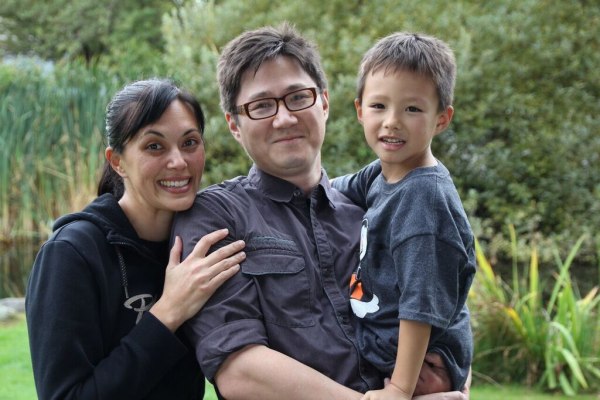
Sharon H. Chang, author of “Raising Mixed Race: Multiracial Asian Children in a Post-Racial World,” with her husband and son. Jeff Chiba Stearns
What are you working on next?
Very thrilled to say I’m working next on a book looking at the truth about Asian-American women facing gendered racism. For this project I’ve been interviewing politicized Asian-American women across the nation. I was planning on 50 interviews but there have been so many amazing women I’ve now conducted 56! You’ll know the final count when the book comes out…hopefully by 2017, 2018? It has again been signed to Routledge and will this time be co-authored with preeminent sociologist Joe R. Feagin, Pulitzer Prize nominee and author of over 60 books on race and gender, including “The Myth of the Model Minority” with Rosalind S. Chou and most recently “How Blacks Built America.”
This article first appeared on NBC Asian America December 31, 2015.










